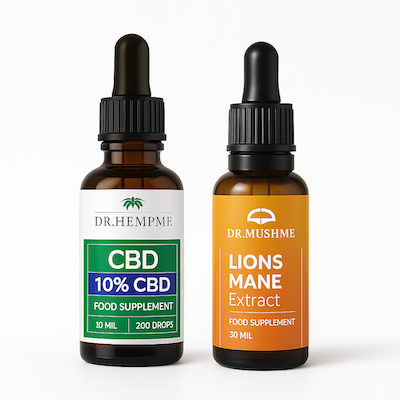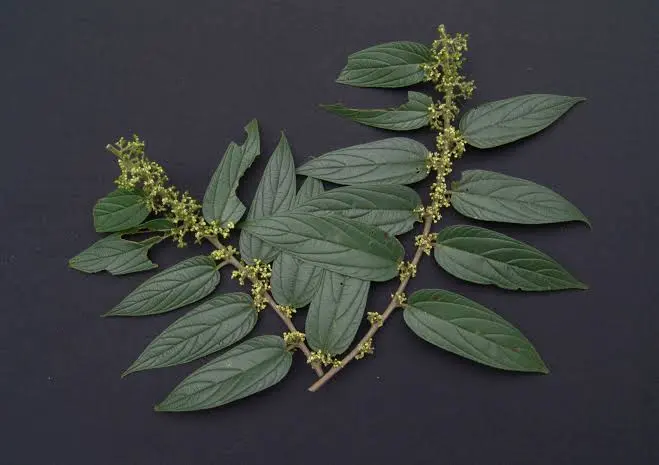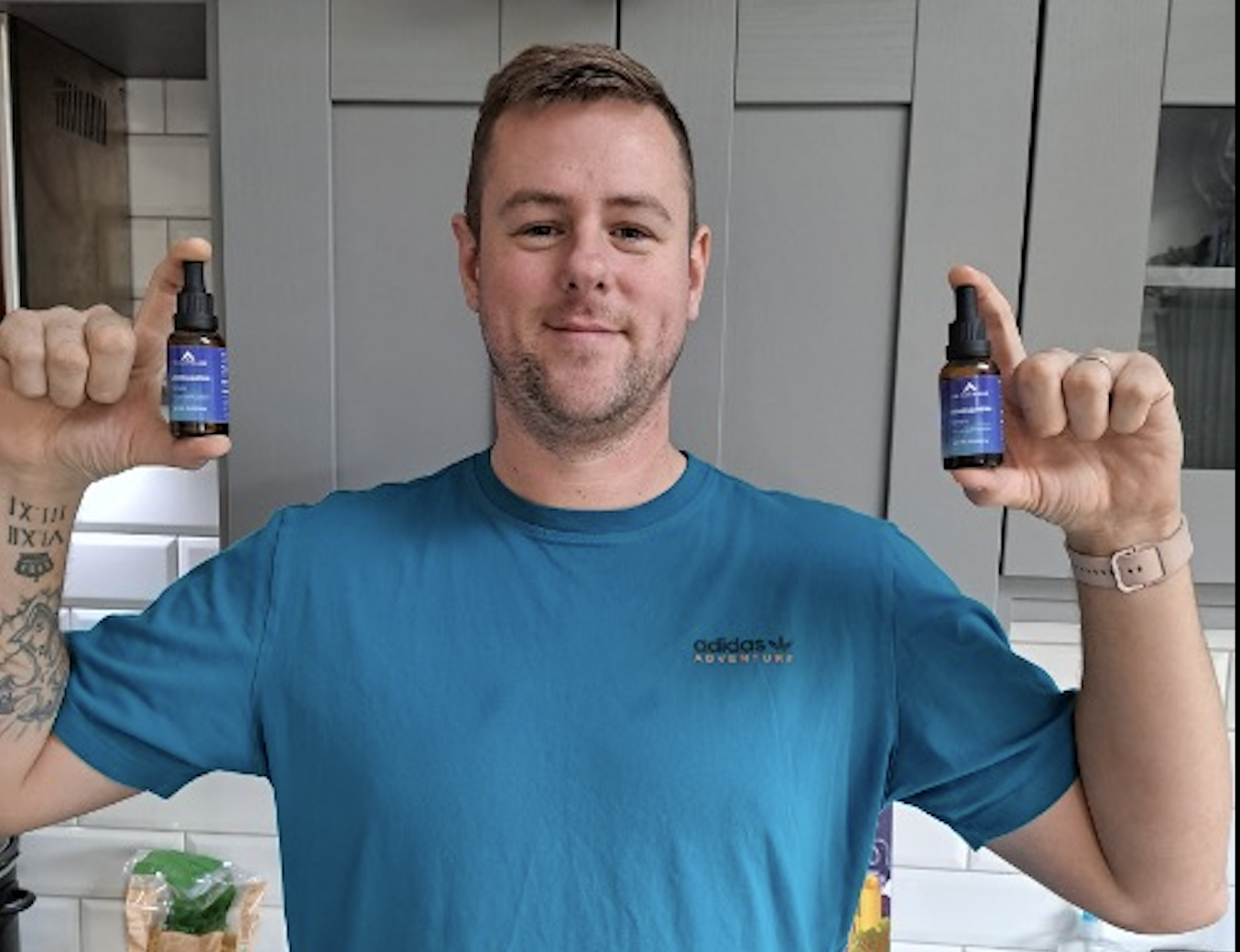If you’ve ever felt like your brain is stuck in fog…
If focus feels like a struggle, your memory’s not what it used to be, or anxiety keeps you running in circles — you’re not alone.
Modern life overstimulates the brain and overwhelms the nervous system. That constant low-grade stress? It adds up. Sleep becomes lighter. Emotions get frayed. And over time, clarity fades into a kind of blurry mental static.
That’s where Lion’s Mane and CBD come in — and why more and more people are combining the two into a powerful, daily stack to support both mind and body.
And for a limited time, when you order our 10% Full-Spectrum CBD Oil, we’ll send you a FREE bottle of premium Lion’s Mane extract (worth €40) to try it for yourself.
What is Lion’s Mane?
Lion’s Mane (Hericium erinaceus) is a white, shaggy mushroom that looks — as the name suggests — like a lion’s mane. But inside this quirky fungus is a powerhouse of natural compounds that science is now linking to:
-
Improved memory and learning
-
Mental clarity and focus
-
Mood balance and reduced anxiety
-
Nerve regeneration and brain repair
Lion’s Mane has been used in traditional medicine for centuries in Asia, and today it’s become one of the most researched nootropic mushrooms in the world.
What makes Lion’s Mane special is its ability to stimulate nerve growth factor (NGF) — a protein that helps your brain repair itself, grow new neurons, and protect against cognitive decline.
What is CBD?
CBD (short for cannabidiol) is a non-psychoactive compound found in the hemp plant. Unlike THC, it won’t get you high. Instead, CBD works by interacting with your endocannabinoid system (ECS) — the biological network responsible for maintaining homeostasis in your body.
This system helps regulate:
-
Sleep
-
Stress response
-
Inflammation
-
Mood
-
Immune balance
-
Pain perception
CBD supports your ECS and helps restore balance — gently and naturally.
Our 10% Full-Spectrum CBD Oil is one of our bestsellers, trusted by thousands across Ireland, the UK, and beyond. It’s strong enough to make a real difference — but still gentle on your system.
Why Combine Lion’s Mane with CBD?
On their own, both Lion’s Mane and CBD offer powerful benefits. But together, they form a stack that’s uniquely suited for the demands of modern life.
Here’s what happens when you take both:
-
Lion’s Mane helps improve cognitive function — focus, memory, clarity
-
CBD helps calm your nervous system — easing anxiety and emotional reactivity
-
Lion’s Mane encourages brain repair and neuroplasticity
-
CBD helps your body absorb calm — physically, mentally, and emotionally
-
The result? Clear thinking + calm energy + less stress
Think of it as a “brain and body reset” — natural, non-addictive, and surprisingly powerful when used consistently.
Real Results from Real Customers
We’ve been quietly testing this stack with customers for the last year — and the feedback has been incredible.
“I started with CBD for anxiety and sleep, but the Lion’s Mane gave me back my sharpness. I’m 49, running a business, and honestly hadn’t felt this mentally clear in years.”
— Colin, Cork
“I was skeptical, but wow. CBD helped my body feel calm — less tension in my chest. The Lion’s Mane is what surprised me. After about 10 days, my brain fog was noticeably better. I’m getting more done, and my mood is better too.”
— Angela, Galway
“It’s subtle, not like caffeine or a stimulant. But over time, I just felt more like myself again. Focused, calm, and steady.”
— Niall, Limerick
The Science Behind This Stack
Lion’s Mane & Neurogenesis
Lion’s Mane contains two rare compounds — hericenones and erinacines — that stimulate the production of NGF (nerve growth factor) in the brain. NGF supports:
-
New neuron growth
-
Repair of damaged nerves
-
Enhanced synaptic plasticity (how well your brain forms new connections)
Animal studies and preliminary human trials suggest that Lion’s Mane may help with:
-
Mild cognitive impairment (MCI)
-
Mood disorders like anxiety and depression
-
Recovery from nervous system injuries
It’s also being studied for potential neuroprotective effects in Alzheimer’s and Parkinson’s.
CBD & The Nervous System
CBD doesn’t boost energy or cognition directly. Instead, it reduces the noise in your nervous system — so your body and brain can function properly.
Here’s what the research shows:
-
Anxiety: CBD can reduce symptoms of general and social anxiety disorders
-
Sleep: Supports better sleep onset and fewer night-time awakenings
-
Inflammation: Reduces neuroinflammation — a hidden cause of “brain fog”
-
Mood: Helps modulate serotonin and dopamine systems
When paired with a nootropic like Lion’s Mane, CBD acts like the stabilizer — creating a foundation of calm that enhances the benefits of Lion’s Mane.
Why This Offer Matters
We believe this combination is so effective, we want you to experience it risk-free.
So, for a limited time, when you order our 10% Full-Spectrum CBD Oil, we’ll include a FREE bottle of Lion’s Mane extract — normally €40 — at no cost to you.
Here’s what you get:
✅ 10% Full-Spectrum CBD Oil (1000mg) — our best-selling formula
✅ Lion’s Mane Mushroom Extract — Ultrasonic-extracted for maximum potency
✅ Combined value: €99.95
✅ Your price: €59.95
How to Use Them Together
Mornings:
-
Take 1–2 Lion’s Mane capsules with water
-
Optional: Take CBD if you feel stress early in the day
Evenings:
-
1 full dropper of CBD (0.7ml) under the tongue
-
Hold for 90 seconds, then swallow
-
Optional: Take a 2nd dose of Lion’s Mane if needed for focus or clarity
Most people notice effects within 7–10 days — with deeper benefits emerging over 3–4 weeks.
Who Is This Stack For?
This combo works beautifully for people who:
-
Wake up groggy and tired (even after 8 hours)
-
Struggle with anxiety, stress, or panic
-
Feel mentally scattered or unproductive
-
Experience brain fog, memory issues, or poor concentration
-
Want to age well — and protect brain function long-term
-
Prefer natural solutions over pharmaceuticals
It’s not a quick fix. It’s a rebalancing — and it works with your body, not against it.
100% Transparency & Quality You Can Trust
At Dr. Hemp Me, we don’t cut corners — ever.
-
✅ 3rd-party lab testing on all products
-
✅ Clinically informed dosages, not marketing fluff
-
✅ Full-spectrum hemp extracts — rich in cannabinoids and terpenes
-
✅ Ultrasonic-extracted mushrooms — potent, bioavailable, clean
We use what we sell. Our team takes these products daily. And we built this company because nothing else worked for our own families.
No hype. No snake oil. Just real results — grounded in science and built on trust.
Act Now — This Offer Won’t Last
Our Lion’s Mane extract is a premium product, and we can’t give it away forever.
This free offer is only available while stock lasts — and once it’s gone, it’s gone.
If you’re feeling the effects of stress, fog, or fatigue…
If you want to feel mentally sharper and emotionally more stable…
If you’re tired of gimmicks and ready for real solutions…
Get the Brain & Body Stack today.
Buy CBD 10% — Get Lion’s Mane FREE.
[Order Now — Get Free Lion’s Mane →]
Frequently Asked Questions
Q: Will this make me feel high?
No. CBD is non-psychoactive and will not make you high. Our products are fully compliant and safe.
Q: Can I take this with other medications?
Many customers do. But please consult your doctor or pharmacist if you’re on prescription meds.
Q: Is Lion’s Mane safe to take daily?
Yes. Studies have shown Lion’s Mane to be well-tolerated even in long-term use.
Q: How long will one bottle last?
Each bottle of CBD 10% lasts about 30 days at the standard dose. The Lion’s Mane also provides 30 daily servings.
One Last Word
We built Dr. Hemp Me because we were tired of low-dose, low-integrity products in the wellness space. We wanted something honest — something that actually worked.
If you’re looking for clarity, calm, and focus — and you want it naturally, without pills, without dependency, and without the noise…
Try this stack.
Let your nervous system exhale.
Let your brain breathe again.
This might be the simplest thing you do all year — and one of the most impactful.
Conclusion
This may be a new year but there’s nothing new about the interest in plant-based, natural supplements over traditional medications.
Why might you ask?
The interest stems from women and men alike for several reasons. One main reason is the negative side effects of many prescription medications including the safety of long-term usage.
Another is the rise in consciousness of what we are putting into our bodies.
Is it safe, is it natural, is there sufficient evidence of safe long-term usage?
Both nootropic mushrooms, like Lion’s Mane, and hemp-derived supplements like CBD oils fall into the category of natural, plant-based supplements and come with a good safety profile. Side effects are rare, and all have been used since ancient times as holistic methods to stay healthy [1].
Eastern medicine makes use of nootropics and CBD is consistently showing up as a popular choice for both women and men looking for plant-derived relied from a variety of health issues. Or simply for general wellbeing. Let’s dive in further.
CAN YOU TAKE LION’S MANE WITH CBD?
The answer is yes! Lion’s Mane and all other nootropic mushrooms are perfectly safe to use alongside CBD oils and other hemp supplements. In fact, they may very well complement one another. It is suggested that the user take one dose of each supplement daily.
Use CBD in the morning and Lion’s Mane in the afternoon or vice versa. Some people choose to take them one after the other, it is safe and fine either way, whatever suits you and your routine. More research is needed but the anecdotal evidence file builds. Another popular combination is the CBG cannabinoid and this nootropic mushroom.
There are a growing number of research trials undertaken for both functional mushrooms and Cannabidiol, of which positive results can be seen. So, what if you want to add not one but both Lion’s Mane and CBD to your diet? Let’s explore the guidance around adding these dietary supplements to your day and how best to do it.
HOW DOES CBD WORK?
CBD interacts with a system in our bodies called the Endocannabinoid system. This is a network which works to balance the body and control functions such as our sleep cycle, stress responses, pain regulation, hormone regulation and more. Cannabinoids found in the hemp plant mimic the role of natural endocannabinoids which are produced by our brains.
This means when we take CBD Oil and other CBD products, we are adding compounds to our system which support the work of natural endocannabinoids produced in us. These endocannabinoids are not always in balance for reasons such as illness or stress [4].
Adding CBD cannabinoids to your diet daily means you are supporting the supply in your system and helping your whole body to regulate correctly. The same even goes for animals and our beloved pets.
HOW DOES LIONS MANE WORK?
Lion’s Mane mushroom (Hericium erinaceus) works by stimulating the production of nerve growth factors (NGFs) in the brain, which are needed for the growth and maintenance of neurons. These bioactive compounds, hericenones and erinacines, found in Lion’s Mane mushroom, can cross the blood-brain barrier to promote neural plasticity, enhance cognitive functions, and potentially aid in the repair of nerve damage.
Regular consumption of Lion’s Mane has been associated with improved memory, focus, and overall mental clarity due to its neurotrophic effects. Additionally, its anti-inflammatory and antioxidant properties contribute to overall brain health, making it a valuable ally against age-related cognitive decline.
Chinese and Japanese medicine also make use of this nootropic mushroom for digestive issues, ulcers, insomnia and more [2].
WHY USE HERICIUM ERINACEUS WITH CBD?
Support your CBD routine with a tried and tested supplement like Lions Mane mushroom. Both supplements work in different ways in the human body which is one reason they can be easily used together. Neither interferes with the other’s work.
CBD usage varies greatly, as does that of Lion’s Mane mushroom. Neither supplement has just one use. CBD is noted in many research studies and clinical trials to help with both the body and mind including help with anxiety, chronic pain and sleep [5].
Lion’s Mane uses are also many which is evident from its use as a treatment option in Eastern medicine practices. This nootropic is beneficial for the health of the brain and according to research it is also beneficial to the function of all vital organs [3].
So maybe the real question we should be asking is, why not use Lion’s Mane mushroom with CBD? We can think of no good answer.
DISCLAIMER: All food supplements mentioned in this article are not intended to be used as a cure or sole treatment of any medical condition. Please contact a professional such as a pharmacist or doctor before adding such supplements to your diet alongside medication.
REFERENCES
- John, F. (2016) Industrial Hemp: Renewed Opportunities for an Ancient Crop, Critical Reviews in Plant Sciences, 35:5-6, 406-424, DOI: 10.1080/07352689.2016.1257842
- Spelman, K. et. al (2017) Neurological Activity of Lion’s Mane (Hericium erinaceus) Journal of Restorative Medicine, Volume 6, Number 1, 12 March 2017, pp. 19-26(8)
- Khan, M.A. et. al (2013) Hericium erinaceus: an edible mushroom with medicinal values. J Complement Integr Med. 24;10
- Rapin, L. et. al (2021) Cannabidiol use and effectiveness: real-world evidence from a Canadian medical cannabis clinic. J Cannabis Res. 23;3(1):19
- Sholler, D.J. et. al (2020) Therapeutic Efficacy of Cannabidiol (CBD): A Review of the Evidence from Clinical Trials and Human Laboratory Studies. Curr Addict Rep. 2020 Sep;7(3):405-412

























